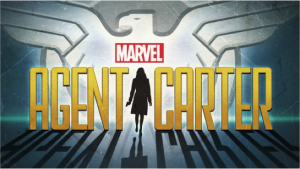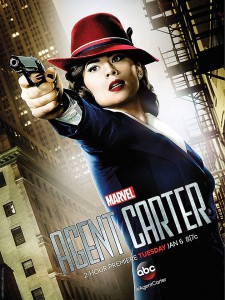The Back-story: The Feminist Achievement of Agent Carter
 Marvel’s Agent Carter’s has been the center of many feminist critiques since its premiere earlier this year. Some praise the show as a victory for feminists and female fans, since Peggy Carter is the first female protagonist in Marvel’s Cinematic Universe franchise, while others criticize it for its blatantly obvious feminist messages. While I do believe obvious criticism towards sexism is effective as a wake-up call to contemporary misogyny, it is not the feminist comments that make Agent Carter a feminist achievement Rather, its powerful statement comes from the show itself.
Marvel’s Agent Carter’s has been the center of many feminist critiques since its premiere earlier this year. Some praise the show as a victory for feminists and female fans, since Peggy Carter is the first female protagonist in Marvel’s Cinematic Universe franchise, while others criticize it for its blatantly obvious feminist messages. While I do believe obvious criticism towards sexism is effective as a wake-up call to contemporary misogyny, it is not the feminist comments that make Agent Carter a feminist achievement Rather, its powerful statement comes from the show itself.
In recent years, the superhero genre has been doing better regarding female characters. Comics publishers for example are announcing more titles with believable female protagonists, finally becoming aware of their increasing female readers. However, historically the genre itself, which includes not only comics but also adaptation films, has always had problems with their female representations in the past that still exists now. Marvel Studios, after ten films have yet to give their viewers a female protagonist. The next two new superheroes scheduled to have their own films next are Ant-Man (2015) and Doctor Strange (2016), who are again, male, and it is not until 2018 that a Captain Marvel film will be released with a central female character. Film adaptations of DC Comics’ heroes are no better. In the last decade, what we have gotten are several Batmans and Supermans, with a bit of Green Lantern and Jonah Hex. Despite Wonder Woman being one-third of the Big Three in the DC Universe, she will only be finally introduced on movie screens in Batman v Superman next year. Her own film is not scheduled until the year after that.
Lack of representations is not the only problems female characters in superhero comics have faced and are still facing now; stereotyping has always been an inescapable issue. One of the most famous stereotypes that women are confronted with is the Damsel in Distress, which is a theme briefly explored in the second episode Agent Carter. As Peggy sneaks up behind a man who drives the truck that is believed to have delivered Howard Stark’s stolen weapons, the Captain America radio show plays in the background. In the radio show, Peggy is no agent or officer, but a “beautiful triage nurse” who is taken hostage numerous times, doing nothing but forever wait for Captain America to come rescue her. The sound effects for the radio show’s Captain America punching out his enemies created by smacking a chunk of meat syncs perfectly with Peggy’s kicks and hooks. When radio show Peggy encourages her Captain to “hit him again,” it is the actual Peggy that obliges, thus in a strange way, saving herself. Finally, when the radio’s Captain America asks if “Miss Carter” is all right, Peggy looms over the man she has easily beaten (on her own), asking in disbelief if that is “all [the man]’s got.” By syncing the fighting scene with the radio show, Agent Carter allows Peggy to knock out her own hopeless Damsel in Distress double, as well as present to the viewers of the show the ridiculous unreality of the stereotype, and how outdated it is.
Unfortunately, constraints of female characters do not end with stereotyping either. It should be mentioned that whatever stereotype the heroine is subjugated to, in many cases they are reduced to the plot device named “the love interest,” and rarely are they privileged with full stories of their own. After all, how many of us are fully familiar with back or side stories of Lois Lane or Mary Jane Watson like we are with Superman or Spider-Man?
 However, this is what makes Agent Carter interesting: “the love interest” is where Peggy Carter started. There is no denying that Peggy was amazing character when she first appeared in Captain America: The First Avenger (2011), but the film was a Captain America movie. She was his love interest in which viewers were given merely minimum information about her character, mostly in relation to Captain America’s tale. Yet Agent Carter sheds light onto this love interest, giving her more than her relationship with Captain America. The series portrays her as a fully developed character who is struggling with her emotions, career, and undercover work. We see a woman who gained strength but also suffered a tragic loss with the war, trying to build a life of her own where she does not quite fit in. She is unsure of herself and her future, but everything changes when she is given a mission to prove Howard Stark’s innocence. With this newly found mission to bring justice to her friend, Peggy Carter rises as a superhero. Agent Carter is about Peggy Carter. Captain America, one of the most famous superheroes in the world, is her back-story.
However, this is what makes Agent Carter interesting: “the love interest” is where Peggy Carter started. There is no denying that Peggy was amazing character when she first appeared in Captain America: The First Avenger (2011), but the film was a Captain America movie. She was his love interest in which viewers were given merely minimum information about her character, mostly in relation to Captain America’s tale. Yet Agent Carter sheds light onto this love interest, giving her more than her relationship with Captain America. The series portrays her as a fully developed character who is struggling with her emotions, career, and undercover work. We see a woman who gained strength but also suffered a tragic loss with the war, trying to build a life of her own where she does not quite fit in. She is unsure of herself and her future, but everything changes when she is given a mission to prove Howard Stark’s innocence. With this newly found mission to bring justice to her friend, Peggy Carter rises as a superhero. Agent Carter is about Peggy Carter. Captain America, one of the most famous superheroes in the world, is her back-story.
Therefore, not only does the series criticize sexism in society by presenting their viewers with Peggy’s unfair treatment from her sexist co-workers or male customers harassing her waitress friend, she fights sexism of her genre by challenging stereotypes that has existed for decades. Unfortunately there have been talks about the series’ low ratings and possibility of cancellation. I sincerely hope this will not happen, for Agent Carter, with Peggy effectively knocking down false beliefs about women, sets an excellent example for future female protagonists and superheroes that may face similar struggles in the superhero genre.


